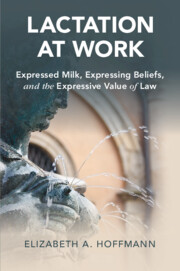Book contents
- Lactation at Work
- Cambridge Studies in Law and Society
- Lactation at Work
- Copyright page
- Dedication
- Contents
- Tables
- Acknowledgments
- Chapter One Introduction
- Chapter Two Lactation Law as Public Policy
- Chapter Three Expressed Frustration
- Chapter Four Milk and Management
- Chapter Five Allies Already
- Chapter Six Moralizing the Law
- Chapter Seven Conclusion
- Book part
- References
- Index
- Cambridge Studies in Law and Society
Chapter One - Introduction
Published online by Cambridge University Press: 20 July 2021
- Lactation at Work
- Cambridge Studies in Law and Society
- Lactation at Work
- Copyright page
- Dedication
- Contents
- Tables
- Acknowledgments
- Chapter One Introduction
- Chapter Two Lactation Law as Public Policy
- Chapter Three Expressed Frustration
- Chapter Four Milk and Management
- Chapter Five Allies Already
- Chapter Six Moralizing the Law
- Chapter Seven Conclusion
- Book part
- References
- Index
- Cambridge Studies in Law and Society
Summary
This book draws on two waves of interviews with human resource personnel, supervising managers, and lactating workers to examine how organizations responded to the Lactation at Work Law. Organizational reactions fall on a continuum, beginning with organizations that refused to comply with the new law. Other organizations that appeared to comply created accommodations that fulfilled the letter of the law, but achieved symbolic compliance that was similarly ineffective; they had refocused their compliance motivation from the law’s ideals, such as equity, to managerial goals, such as reducing absenteeism. Still other organizations similarly shifted from the law’s goals to managerial aims, but, in these organizations, this managerialization of the law produced effective accommodations; preexisting cultural and structural features of the organizations made compliance easy, and workplace lactation enjoyed sufficient legitimacy. Further along the continuum were organizations where compliance was driven by Allies Already, those in management who supported workplace lactation and were poised to create accommodations as soon as the law was in force. The most successful compliance occurred in organizations where supervising managers, through educational conversations with lactating workers, learned more about the benefits of breastfeeding benefits and adopted a morality based on health benefits to children and community wellness.
- Type
- Chapter
- Information
- Lactation at WorkExpressed Milk, Expressing Beliefs, and the Expressive Value of Law, pp. 1 - 27Publisher: Cambridge University PressPrint publication year: 2021



